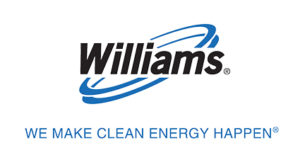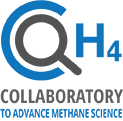CAMS Welcomes New Member to its Leading Collaborative to Advance Methane Emission Science
11/16/2021
Des Plaines, IL
 The Collaboratory for Advancing Methane Science (CAMS) announced today that Williams has joined the industry-led research consortium that works to better characterize and understand methane emissions. CAMS members work collaboratively to provide actionable, transparent methane science to contribute to the understanding of methane emissions across the oil and gas value chain and inform mitigation strategies.
The Collaboratory for Advancing Methane Science (CAMS) announced today that Williams has joined the industry-led research consortium that works to better characterize and understand methane emissions. CAMS members work collaboratively to provide actionable, transparent methane science to contribute to the understanding of methane emissions across the oil and gas value chain and inform mitigation strategies.
Williams joins other CAMS members, including Cheniere, Chevron, ExxonMobil, Pioneer Natural Resources, Sempra LNG, and Shell, who share this commitment to advancing methane science in the public domain.
“As one of the nation’s largest energy infrastructure companies, it is critical to Williams’ mission that we collaborate on the development and evaluation of methane reduction technologies,” said Mark Gebbia, vice president of Environmental, Regulatory and Permitting at Williams. “Joining CAMS’ efforts to create accurate quantification and monitoring of methane emissions not only helps Williams reach our Climate Commitment goals, but also aids the natural gas industry as we come together in our advancement of clean energy.”
The collaborative’s first project, the Methane Emission Estimate Tool (MEET), resulted in the development of a community modeling tool for constructing inventories of emissions from producing oil and gas operations, enabling operators to evaluate effectiveness of both detection and mitigation strategies. Subsequent projects sponsored by CAMS have applied this tool to simulate areas of higher methane concentrations in association with Project Astra, a pioneering multi-operator sensor network that leverages advances in methane-sensing technologies and data analytics to provide comprehensive and near-continuous monitoring.
Additional CAMS-sponsored projects have included a Permian Basin Aerial Emissions Survey identifying and statistically analyzing leaks in the Permian Basin by type of equipment, along with a first-of-its-kind study conducted by Queen Mary University of London to directly measure methane emissions of an operating liquefied natural gas (LNG) vessel. Results from the LNG Carrier Emissions Measurement study will be published in early 2022 and will provide critical, data-driven insights into the greenhouse gas profile of LNG carriers to identify opportunities for environmental performance improvement.
Looking ahead, CAMS members are planning to focus on improving our understanding of satellite emissions data as well as create refined emissions profiles and methane abatement strategies for natural gas pneumatic control devices.
“In the Permian, the midstream sector plays a critical role in minimizing methane emissions,” said Mark Berg, EVP of corporate operations for Pioneer. “Collectively working with midstream partners like Williams is important to the success of CAMS’ collaborative efforts to understand and resolve methane challenges.”
About the Collaboratory to Advance Methane Science
CAMS is an industry-led collaborative research consortium that works to advance methane science to better understand global methane emissions and the need for additional solutions. CAMS pursues scientific studies that address methane emissions along the natural gas value chain, from production to end use, in basins across the country. Studies focus on detection, measurement, and quantification of methane emissions to create the best-possible mitigation strategies.
About GTI
GTI is a leading research, development and training organization that has been addressing global energy and environmental challenges by developing technology-based solutions for consumers, industry, and government for 80 years. GTI administers the CAMS consortium.

